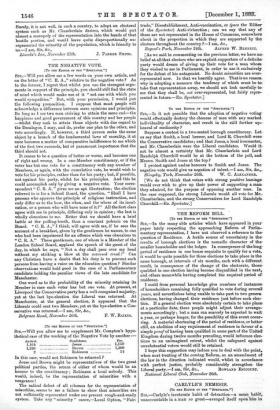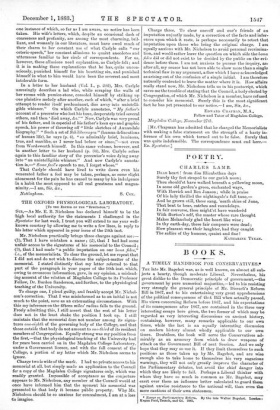CARLYLE'S NEMESIS. [To THE EDITOR OF THE " SPECTATOR-1 SIR, — Carlyle ' s
inveterate habit of detraction—a mean habit, unaccountable in a man so great—avenged itself upon him in
one instance of which, so far as I am aware, no notice has been taken. His wife's letters, which, despite an occasional dash of -coarseness and profanity, are among the most charming, bril- liant, and womanly in our literature, must have owed much of their charm to her constant use of what Carlyle calls "our oeteric-speech," her constant allusions to quaint anecdotes and utterances familiar to her circle of correspondents. For us, however, these allusions need explanation, as Carlyle felt ; and -it is in making these explanations that he has, quite uncon- .-sciously, punished himself for his besetting sin, and punished himself in what to him would have been the severest and most intolerable form.
In a letter to her husband (VoL I., p. 202), Mrs. Carlyle amusingly describes a lad who, while scraping the walls of .her rooms with pumice-stone, consoled himself by striking up -one plaintive melody after another, each of which, "after a brief attempt to render itself predominant, diei away into unintelli- gible whinner." On which Carlyle annotates, "My father's 'account of a precentor who lost his tune, desperately tried several -others, and then died away, &c.' " Now, Carlyle was very proud of his father, and in especial of his father's keen eye and graphic speech, his power of throwing off "little sketches of Annandale -biography." "Such a set of Schilderungen" (human delineations -of human life), he says (p. 4), "so admirably brief, luminous, true, and, manlike, as I never had before or since,"—not even from Wordsworth himself. In this same volume, however, and -in another letter to her husband (p. 34), Mrs. Carlyle refers again to this familiar story of the precentor's voice dying away into " an unintelligible whinner." And now Carlyle's annota- tion is,—" Some fool's speech to me, I forget whose."
That Carlyle should have lived to write down even his -venerated father a fool may be taken, perhaps, as some slight atonement for the pain he has caused to many by his indulgence in a habit the most opposed to all real greatness and magna- zimity.—I am, Sir, &c,







































 Previous page
Previous page